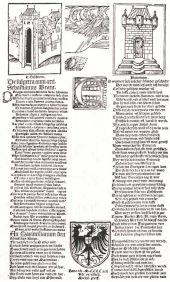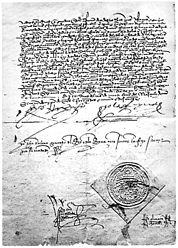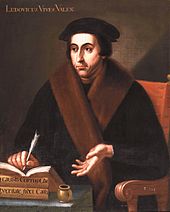1492
Portal history | Portal Biographies | Current events | Annual calendar | Daily item
◄ |
14th century |
15th century
| 16th century
| ►
◄ |
1460s |
1470s |
1480s |
1490s
| 1500s
| 1510s
| 1520s
| ►
◄◄ |
◄ |
1488 |
1489 |
1490 |
1491|
1492
| 1493
| 1494
| 1495
| 1496
| ►
| ►►
| 1492 | |
|---|---|
| Christopher Columbus succeeds in discovering America . | With the Alhambra Edict , the Jews are expelled from Spain . |
| Muhammad XII. after nine months of siege Granada hands over to the Catholic kings of Spain. | |
| 1492 in other calendars | |
| Armenian calendar | 940/941 (turn of the year July) |
| Ethiopian calendar | 1484/85 |
| Aztec calendar | 12. Tubes - Matlactli omome Acatl (until the end of January / beginning of February: 11th Rabbit - Matlactli ozce Tochtli ) |
| Buddhist calendar | 2035/36 (southern Buddhism); 2034/35 (alternative calculation according to Buddhas Parinirvana ) |
| Chinese calendar | 69th (70th) cycle
Year of the Water Rat壬子 ( at the beginning of the year Metal Pig 辛亥) |
| Chula Sakarat (Siam, Myanmar) / Dai calendar (Vietnam) | 854/855 (turn of the year April) |
| Dangun era (Korea) | 3825/26 (October 2/3) |
| Iranian calendar | 870/871 |
| Islamic calendar | 897/898 (turn of the year 22/23 October) |
| Jewish calendar | 5252/53 (September 21/22) |
| Coptic Calendar | 1208/09 |
| Malayalam calendar | 667/668 |
| Seleucid era | Babylon: 1802/03 (turn of the year April)
Syria: 1803/04 (New Year October) |
| Spanish era | 1530 |
| Vikram Sambat (Nepalese Calendar) | 1548/49 (turn of the year April) |
The beginning of 1492 brought the conclusion of the Reconquista in Spain . After several months of siege , Muhammad XII. , the last Emir of Granada , passed the city to the Catholic Kings Ferdinand II and Isabella I of Spain. This is the end of almost 800 years of Muslim history on the Iberian Peninsula .
For the navigator Christopher Columbus , a dream comes true: With the surrender of Santa Fe , Ferdinand and Isabella keep their promise and grant him three ships, funds and extensive privileges to search for the sea route to India on a western route. A few months later, the landing on Guanahani led to the discovery of America . Regardless of the fact that this voyage was neither the first nor the only successful crossing of the Atlantic and America was already settled for a long time, the crossing of Columbus is the most famous in the Age of Discovery and is often used in historical studies as the transition from the Middle Ages to the modern era .
Domestically, the Catholic kings immediately use the conclusion of the Reconquista to expel the Jews: with the Alhambra Edict , tens of thousands of Sephardic Jews who do not want to be forcibly baptized are expelled from Spain.
In Rome, one of the most controversial popes in history takes the chair of Peter: Roderic Llançol i de Borja, who comes from Aragón, succeeds in collecting enough votes through bribery that he is elected successor to the late Innocent VIII at the conclave . The date of his death was correctly predicted by the fanatical penitential preacher Girolamo Savonarola , which gives him a strong political boost in his hometown of Florence . The new Pope takes the name Alexander VI. and quickly begins showering his family with favors and gifts.
In the same year Martin Behaim made the first globe .
events
Politics and world events
Spain and Columbus' voyage of discovery
- January 2: With the handover of the city after a nine-month siege by Boabdil , the last Sultan of Granada , to Ferdinand of Aragón and Isabella of Castile , the almost 800-year rule of the Moors on the Iberian Peninsula and with it the Christian Reconquista come to an end . The former Muslim emirate becomes the Christian kingdom of Granada , which is linked to the kingdom of Castile .
- April 17th: Isabella I of Castile and Ferdinand II of Aragón conclude the surrender of Santa Fe with Christopher Columbus . With this treaty, Columbus enforces all of his demands against the Catholic Kings , on the fulfillment of which he made the project of his "India trip" dependent. The treaty stipulates that Columbus should look for a western sea route to Asia for Spain. He is granted a tenth of the company's expected profit. In addition, the treaty guarantees Columbus the titles of admiral of the ocean , viceroy and governor-general , which he requires . He is appointed chief judge in all disputes between Spaniards in the future colonies , is allowed to call himself Don and is given the right to bear arms.
- August 3rd: Christopher Columbus sets sail for his first voyage to America .
- October 12: Christopher Columbus arrives in America (the Bahamas ) and discovers this continent for Christian Europe ; he is convinced that he has reached Asia.
- October 28: Christopher Columbus reaches the island of Cuba on his first voyage .

- December 5th: Christopher Columbus lands on the island of Hispaniola .
- December 25th: The Santa Maria , the flagship of Christopher Columbus, is shipwrecked off the island of Hispaniola . Some of the crew remained in the settlement of La Navidad , which was also timbered with the remains of the ship .
Holy Roman Empire
- August 12: The Asseburg near Wolfenbüttel is burned down by the city council of Braunschweig before it was conquered by Duke Heinrich the Elder of Braunschweig.
India
- As the fourth of the five Dekkan sultanates , Bidar gains independence from the Bahmani Sultanate .
business

- In the Schneeberg Mint and the Zwickau Mint , so-called beard groschen with the bearded bust of the Saxon Elector Friedrich III. embossed. The groschen are the first Saxon coins with a portrait of the regent. The Ernestine Elector Friedrich III. first lets them beat alone with his brother Johann . According to this, the groschen are a joint coinage of Frederick III. with his brother Johann and the Albertine Duke George the Bearded .
- The Stiegl brewery in Salzburg is first mentioned in a document.
- The Hofmühl brewery in Eichstätt (Bavaria) is founded.
science and technology
- Martin Behaim makes the first globe , his " Erdapfel ".
- Antonio de Nebrija publishes the first Spanish grammar (Gramática española).
Culture and society
- June 26th: Antoine de Ville succeeds in climbing Mont Aiguille in the French western Alps, commanded by France's King Charles VIII . When climbing the mountain for the first time , ladders are used in addition to mountaineering equipment.
- For his large-format paintings in the hall of the great council in the Doge's Palace in Venice , Alvise Vivarini was awarded the honorary title of Depentor in Gran Conseio and from then on received a salary of five ducats a month.
- The sweeping week is introduced in Swabia .
religion
The Alhambra Edict in Spain
The " Catholic Majesties " Isabella I and Ferdinand II sign the Alhambra Edict on March 31st to expel all Sephardic Jews from Spain who do not want to be baptized .
On July 31, the ultimatum expires for the expulsion of all Jews in Spain who are unwilling to coercive baptism . Between 80,000 and 300,000 Jewish people in Spain have to leave their homes and yards. A third of them go to Portugal, a third to Turkey, around 25,000 go to the Netherlands, the same number are likely to have gone to North Africa, primarily to Morocco, the rest are spread across France, Italy and Egypt. Gold and other jewelry as well as money are to be left to the Catholic government.
papacy
Pope Innocent VIII dies in Rome on July 25th. The fact that his death date of Savonarola has been correctly predicted, resulting in that this charismatic preacher that the abuses of Church state violently lashes, receives an even larger inlet and contributes significantly to its takeover 1494 in Florence.
Supported by funds of Ferdinand of Aragon wins Rodrigo de Borja, a Spaniard from the family Borgia , by bribing the office of Pontifex Maximus , the Pope of the Roman Church. The election of the successor to Innocent VIII, who died in July, takes place after a five-day conclave on August 11th. Rodrigo takes the name Alexander VI. on.
Archdiocese of Granada
On December 10th, Pope Alexander VI. the diocese of Granada to the archbishopric . Hernando de Talavera becomes first archbishop . There are only a few priests in the new archdiocese , hardly any consecrated churches or monasteries and no ecclesiastical administrative structures. Only a small part of the population is made up of baptized Christians or speaks Spanish . Talavera has already stated his views on the conversion of the Mohammedans in various writings, now he has to put these theoretical considerations into practice. Talavera endeavors to strictly adhere to the specifications of the contracts for the transfer of Granada to the Catholic Monarchs, which he himself was involved in drafting. He demands that the conversion of Muslims should be done by conviction and not by the use of force. Talavera promotes the printing of a textbook of the Arabic language by Pedro de Alcalá and encourages his pastors to learn Arabic in order to be able to communicate with parishioners. This attitude is opposed to the new confessor of the Queen Francisco Jiménez de Cisneros .
nature and environment

- November 7th: The meteorite known as the Ensisheim meteorite falls into a wheat field between Ensisheim and Battenheim in Alsace .
Born
Date of birth saved
- January 1: Silvestro Ganassi , Italian viol and recorder player and composer († 1550)
- January 20: Werner Steiner the Younger , Swiss reformer († 1542)
- January 22nd: Beatrix von Baden , Margravine of Baden († 1535)
- March 6: Juan Luis Vives , Spanish humanist, philosopher and teacher († 1540)
- March 21: Johann II of Simmern , Count Palatine († 1557)
- March 26: Adam Ries , German arithmetic master, mathematician and author of arithmetic books († 1559)
- April 4: Ambrosius Blarer , German Protestant theologian, hymn poet and reformer († 1564)
- April 11: Margaret of Angoulême , Duchess of Alençon and Queen of Navarre, poet and diplomat († 1549)
- April 20: Pietro Aretino , Italian writer († 1556)
- April 24: Sabina of Bavaria , Duchess of Bavaria and wife of Ulrich, Duke of Württemberg († 1564)
- April 26: Philip I , Count of Nassau-Wiesbaden-Idstein († 1558)
- May 8: Andrea Alciato , Italian lawyer and humanist († 1550)
- August 1: Wolfgang , Prince of Anhalt-Köthen and reformer († 1566)
- August 24: Bartholomaeus Rieseberg , German Protestant theologian († 1566)
- September 7th: Giacomo Aconcio , Italian humanist, philosopher, theologian, lawyer and engineer († around 1567)
- September 7: Michael Caelius , German Lutheran theologian and reformer († 1559)
- September 12: Lorenzo di Piero de 'Medici , Duke of Urbino and ruler of Florence († 1519)
- October 1: Georg Rörer , German Protestant theologian and colleague of Martin Luther († 1557)
- November 12: Johann Rantzau , general in Danish service († 1565)
- November 17: Simone Pasqua , Italian Cardinal of the Roman Catholic Church († 1565)
Exact date of birth unknown
- Vittoria Colonna , Italian poet († 1547)
- Wilhelm Nesen , German humanist and educator († 1524)
Born around 1492
- Jörg Blaurock , leading Swiss figure of early Anabaptism († 1529)
Died
Date of death secured
- March 10: Philip II , Count of Nassau-Weilburg (* 1418)
- MARCH 15: . Dietrich IV of Schoenberg , Rector of the University of Leipzig and Bishop of Naumburg (* 1410 /11 )
- April 8th: Lorenzo de 'Medici , called il Magnifico , Italian banker and politician, city lord of Florence (* 1449)
- June 7th: Casimir IV , Grand Duke of Lithuania and King of Poland (* 1427)
- June 8: Elisabeth Woodville , Queen of England (* around 1437)
- July 1: Heinrich the Younger , Duke of Münsterberg, Count of Glatz and Bohemian diplomat and writer (* 1452)
- July 25th: Innocent VIII , actually Giovanni Battista Cibo, Pope (* 1432)
- July 26th: Heinrich IV. Von Absberg , Bishop of Regensburg (* 1409)
- September 18: Adolf von Kleve , governor-general of the Burgundian Netherlands (* 1425)
- September 21: Konrad X. , Duke of Oels, Cosel, Steinau and half of Beuthen (* 1420)
- September 29: Domenico Gagini , Lombard sculptor (* around 1425)
- October 12: Piero della Francesca , Italian painter, art theorist and mathematician (* around 1420)
- October 22nd: Simon von der Borch , Bishop of Reval
- November 1st: René , Duke of Alençon (* 1454)
- November 19: Jami , Persian mystic and poet (* 1414)
Exact date of death unknown
- Anne Neville, 16th Countess of Warwick , English noblewoman (* 1426)
- Andreas Ritzos , Greek icon painter (* 1421)
- Ludwig Vogelweider , Swiss businessman and mayor (* before 1454)










